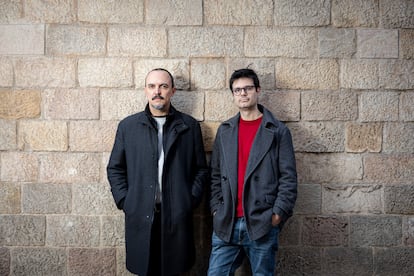‘Upon Entry’: how a low-budget thriller that cost 100 times less than ‘Society of the Snow’ sneaked into the Goya Awards
Spanish cinema’s surprise of the year has to be the three nominations for the film debut of Venezuelans Alejandro Rojas and Juan Sebastián Vásquez at this Saturday’s ceremony

It was rejected by powerful streaming platforms, by some of the main film festivals in the world from Venice to Sundance, and by practically all independent distributors in Spain. But Upon Entry has been able to break down the barriers that prevented it from reaching the general public. Slowly but surely, the directorial debut of Alejandro Rojas and Juan Sebastián Vásquez, two Venezuelan filmmakers with no experience beyond editing and cinematography, has become one of the breakout hits of the year in Spanish cinema.
Despite not having a presence in the majority of categories, the film about a couple caught up in the Kafkaesque web of United States immigration bureaucracy, has been sneaking into the nominations for all the season’s awards. Upon Entry has been nominated for three Goya Awards (Best Actor for Alberto Ammann, New Director, and Original Screenplay) that will be presented this Saturday.
Upon Entry has also been nominated for Best Film at the Forqué Awards, and it has already won Best Script in both the Gaudí and the Feroz Awards in Spain. Not to mention its three nominations (Best First Feature, Best First Screenplay, and Best Editing) in the Independent Spirit Awards, which have celebrated films produced outside the major studios since 1984 (and in which they will compete with titles such as May/December by Todd Haynes). It is quite a feat, considering that the film was not even released in American theaters (instead, it was released on the Tubi platform, which has 74 million subscribers).
To understand the phenomenon, you have to go back to the beginning. It all started eight years ago, when the film’s directors began to write a script inspired by their own experiences as migrants. They had become friends years before, when they worked for HBO Latin America, which was then based in Caracas. Later, they both emigrated for different reasons. Vásquez went to study at ESCAC, the prestigious Barcelona film school, and Rojas moved to London because he had family living in the city.
Finding financing was not easy. “Everything was against us. We were two Venezuelans living in Barcelona who aspired to make a film shot in three languages and that took place in a single setting,” the directors say. They also faced the film Spanish film industry’s “light racism.” “No one threw stones at us, but they did ask us what we were looking for in Spain,” says one. “There were those who told us that the script seemed like a Venezuelan soap opera,” adds the other.

The film tells the story about Diego and Elena, who are an urban planner from Venezuela and a dancer from Catalonia (Spain), and who aspire to start a new life in the United States. But nothing goes as planned. Upon disembarking at Newark airport, the police interrogate them for hours in a holding cell — “a non-place,” say its directors, “in which a 60-minute sequence takes place.” The interrogation brings to light secrets that will question their desire to change countries and even their own relationship.
The story can be seen as a chronicle of the end of the Trump years. “Although it was no easier to enter the United States with Obama as president,” Rojas and Vásquez clarify. The project was born as a short film, until they realized that they had a feature film on their hands. It would talk about a supposedly privileged immigration that also comes face to face with borders that are closed.
With Carles Torras (Callback, The Paramedic) enlisted as producer and Ammann confirmed as the lead, they began searching for someone to play Elena. They found her in Bruna Cusí, who starred in Summer 1993 and has become one of the successful faces in Spanish cinema. “By the time I got to page six of the script, I knew I wanted to do it. It talked about the abuses of power at the borders, but also about the psychopathic system that governs this world,” Cusí recalls.
The next day, she participated in “a covert audition” over Skype with the directors, who cast her shortly thereafter. To underline the realism that the story demanded, Cusí signed up for dance classes for three months to shape “Elena’s body, enhanced by her European privilege.” She also liked that the film is 74 minutes long, another of the keys to its success. “There is a trend of making three-hour films, when not all stories need it,” says Cusí.
For the directors of ‘Upon Entry’, racism and prejudice also exist in Spanish cinema. “No one threw stones at us, but they did ask us what we were looking for in Spain,” they say.
Filming took place in February 2022 for only 17 days and with a limited budget, just under $650,000 (for comparison, Society of the Snow cost around $64 million, according to estimates). After receiving very positive receptions at festivals such as Tallinn, Málaga, or South by Southwest — a prestigious event held in Austin, Texas, where the film was popular with the powerful Texas migrant community — the film was released in June 2023 with only 50 prints. “It wasn’t bad, but it wasn’t a success either,” acknowledges producer Carles Torras. “There was fear on the part of the exhibitors and it had a modest start. But, despite that, when people see it, they always value it. At the end of the film, we have seen applause and visceral reactions around the world,” he adds.
Several companies offered to distribute it “under unacceptable conditions” (industry code meaning, for free). Until Karma, specializing in independent cinema and a supporter of the films of Paolo Sorrentino and Jacques Audiard, decided to take a risk on it. “Its box office was modest, although not disastrous: 20,000 people paid to see it,” says Torras.
“In the cinema it did not meet expectations, but its arrival on streaming platforms catapulted it to being one of the films of the year,” says Filmin’s editorial director, Jaume Ripoll.
The real avalanche did not arrive until October, when the film landed on Movistar and, above all, on Filmin. It became the most viewed Spanish film of 2023 through that streaming platform’s subscribers. “In the cinema it did not meet expectations, but its arrival on streaming catapulted it to being one of the films of the year, Filmin’s editorial director, Jaume Ripoll confirms. “It is a short, concept movie, with brilliant actors and effective script twists, and it talks about issues that challenge us all. It looks great and is talked about even better, which explains how it has become so popular through word of mouth.”
After this second life, the movie may still have a third. Netflix will add it to its catalog at the end of 2024, which will show it to an audience of millions of viewers. Although its main achievement could be that it has paved the way for Latin American directors residing in Spain, who are virtually absent from the cinematographic panorama. “If it helps others to follow, all this will have been worth it,” say Rojas and Vásquez, who are also planning new projects together and separately. “We are not going to be the Coens or the Wachowskis, but we want to continue.”
Sign up for our weekly newsletter to get more English-language news coverage from EL PAÍS USA Edition
Tu suscripción se está usando en otro dispositivo
¿Quieres añadir otro usuario a tu suscripción?
Si continúas leyendo en este dispositivo, no se podrá leer en el otro.
FlechaTu suscripción se está usando en otro dispositivo y solo puedes acceder a EL PAÍS desde un dispositivo a la vez.
Si quieres compartir tu cuenta, cambia tu suscripción a la modalidad Premium, así podrás añadir otro usuario. Cada uno accederá con su propia cuenta de email, lo que os permitirá personalizar vuestra experiencia en EL PAÍS.
¿Tienes una suscripción de empresa? Accede aquí para contratar más cuentas.
En el caso de no saber quién está usando tu cuenta, te recomendamos cambiar tu contraseña aquí.
Si decides continuar compartiendo tu cuenta, este mensaje se mostrará en tu dispositivo y en el de la otra persona que está usando tu cuenta de forma indefinida, afectando a tu experiencia de lectura. Puedes consultar aquí los términos y condiciones de la suscripción digital.









































